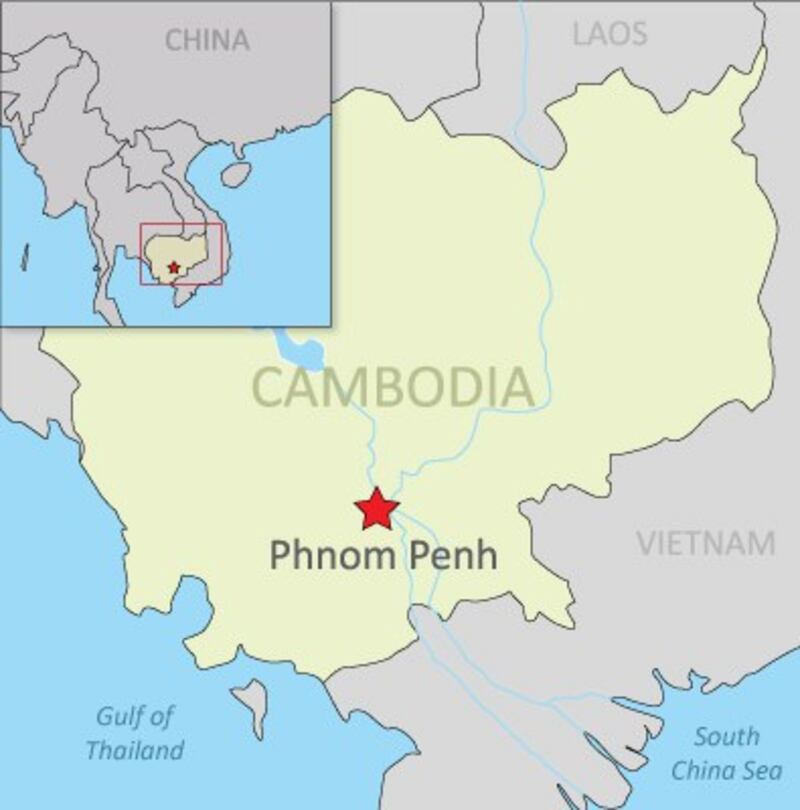Updated at 11:30 a.m. EST on 2012-11-13
An international rights watchdog charged Tuesday that Cambodia's Prime Minister Hun Sen’s iron-fisted rule has led to hundreds of political killings, saying the country has made “almost no progress” on addressing impunity.
More than 300 people have been killed in in the past two decades in politically motivated attacks that have gone unpunished, New York-based Human Rights Watch (HRW) said in a stinging report on the rights situation in the country.
None of the cases resulted in a credible investigation and conviction and instead, the perpetrators were protected by the government, HRW said in the report released ahead of U.S. President Barack Obama's landmark trip to Cambodia next week to attend a regional summit.
“Instead of prosecuting officials responsible for killings and other serious abuses, Prime Minister Hun Sen has promoted and rewarded them,” HRW’s Asia director and report co-author Brad Adams said in a statement.
“The message to Cambodians is that even well-known killers are above the law if they have protection from the country’s political and military leaders.”
The report, titled “Tell Them I Want to Kill Them,” examines killings and other abuses committed in the country since the 1991 Paris Agreements, when the U.N. helped broker a peace settlement among competing political factions following the fall of the brutal Khmer Rouge regime and laid the foundations for the country’s first elections.
But despite rights protections included in the country’s constitution and Cambodia’s accession to international human rights treaties, “almost no progress has been made in tackling impunity over the past two decades” since the peace agreements, the group said.
The report is based on interviews with government officials, members of the armed forces, the police, the judiciary, parliament and other state institutions, and representatives of political parties, labor unions, the media, and human rights organizations.
'Destructive Campaign'
Cambodia's Council of Ministers Spokesman Phay Siphan denounced the report on Tuesday, saying the authorities are working to solve unsolved crimes.
“The government has never been careless about resolving those crimes. We are working gradually," he said.
'This report is [part of] a destructive campaign. They want to see the government and Cambodia look bad,” he said.
The Cambodian government has repeatedly defended its rights record against accusations from rights groups.
In June, Cambodian Secretary of State Kao Kim Hourn dismissed as a “misconception” the notion that the country nurtures impunity.
“There is no such thing as a culture of impunity [in Cambodia],” he said while on a trip to the U.S with Foreign Minister Hor Namhong.
“Anyone that carries out criminal activity [is] subjected to the due process of law in court,” he said.

Obama’s visit
Obama is scheduled to attend a meeting of the East Asia Summit, which is being hosted by Cambodia as the 2012 chair of the 10-nation Association of Southeast Asian Nations (ASEAN), on Nov. 18-20 in Phnom Penh. He will also visit Thailand and Burma on the trip.
It will be the first trip by a sitting U.S. president to Cambodia and Burma.
HRW urged Obama to use the visit to publicly demand systematic reforms and an end to impunity for "abusive" officials in Cambodia.
“On his historic first visit to Cambodia, President Obama is uniquely placed to publicly demand that Hun Sen make genuine reforms so the Cambodian people can enjoy the same rights and freedoms that Americans take for granted,” Adams said.
But so far Cambodia’s donor nations such as the U.S. have failed to press Cambodia on human rights, he said.
“Donor governments, instead of pressing for accountability, have adopted a business-as-usual approach,” Adams said.
“The lack of accountability in Cambodia needs to be addressed head-on, not ignored or downplayed, as so many foreign governments and donors have done over the past 20 years,” Adams said.
On Monday, more than 100 protesters from communities involved in five separate land disputes with the government gathered in front of the U.S. Embassy in Phnom Penh to petition Obama to press Cambodia to respect human rights and resolve the conflicts over land.
Land disputes have been cited as being at the root of Cambodia’s human rights abuses.
In August, U.N. special rapporteur for human rights in Cambodia Surya Subedi submitted a report to the world body accusing the authorities of rights violations over economic land concessions granted to private companies.
In another report, Subedi also warned that Cambodia could plunge into violence if it does not reform the current electoral system to allow for fair and free elections.
Cambodia’s Ministry of the Interior has rebuffed calls for reform of the country’s election committee, saying the people see “no problem” with the voting process.
As Southeast Asia’s longest-serving prime minister, Hun Sen has ruled Cambodia since 1985, and in 2009 said he would continue to stand as a candidate until 2023.
Reported by RFA’s Khmer service. Written in English by Rachel Vandenbrink.
